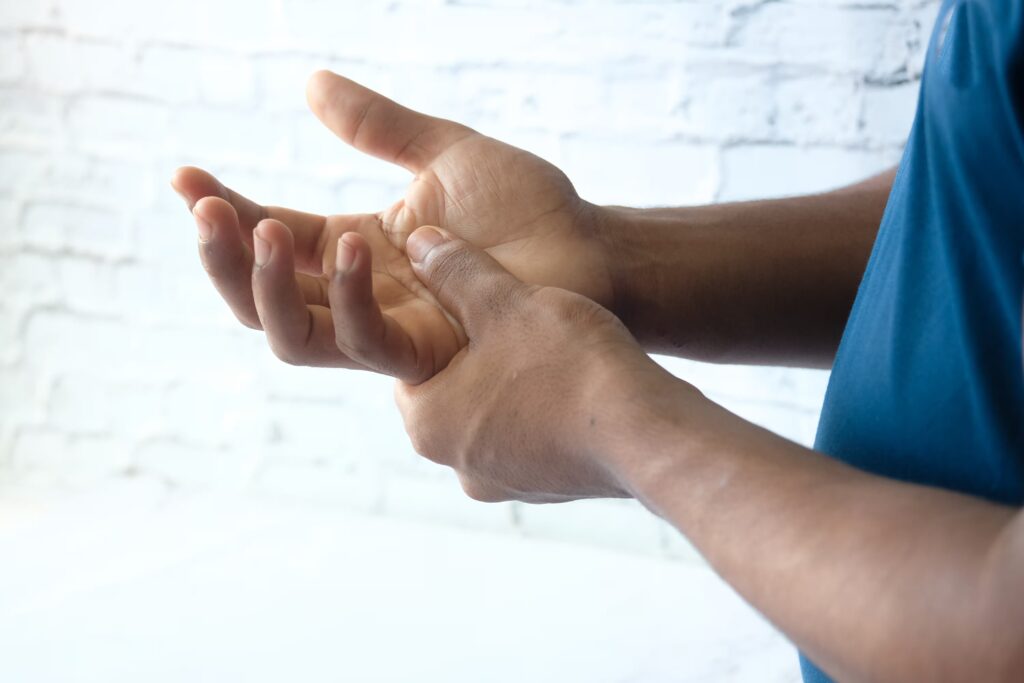
Hand & Wrist Pain
Why early treatment matters
What might seem like a minor ache or stiffness during typing, lifting, or exercise can develop into a more serious problem over time. Ignoring symptoms or relying on DIY support often only masks the issue, potentially leading to stiffness or extended recovery time. Early assessment and treatment can prevent complications, speed up recovery, and help you maintain full use of your hand and wrist.
Common causes of hand and wrist pain
Hand and wrist pain can arise from a range of causes, including:
- Carpal Tunnel Syndrome: Compression of the median nerve causing numbness, tingling, and weakness in the hand.
- Wrist Fracture: Breaks or cracks in the wrist bones from falls or trauma.
- Repetitive Strain Injury (RSI): Pain and inflammation caused by repetitive motions like typing or manual tasks.
- Wrist Tendonitis or DeQuervain’s Tenosynovitis: Inflammation of the tendons or their sheaths, often from overuse or strain.
- Arthritis: Joint degeneration and inflammation, including osteoarthritis and rheumatoid arthritis, causing pain, swelling, and stiffness.
- Ganglion Cysts: Noncancerous lumps that can develop from joint spaces in the wrist and hand.
- Trigger Finger: A condition where a finger gets stuck in a bent position due to an inability of the tendon to glide through its usual pathway.
- Dupuytren’s Contracture: Genetic shortening and adhesion of the tendons in the palm causing fingers to flex, usually painless.
What you can do now
If you’re starting to feel discomfort in your hand or wrist, here are a few simple steps you can take right away:
- Take regular breaks from repetitive tasks like typing or lifting
- Avoid movements that aggravate the pain
- Apply ice or gentle compression to reduce swelling
These tips can provide short-term relief, but if your symptoms don’t improve after a few days, it’s worth booking an assessment.
How we can help
If you’re struggling with hand or wrist pain, we will help you understand what’s going on and get you on the right path to recovery.
Your first appointment includes a full assessment where you’ll have time to talk through your symptoms and how they’re affecting your daily activities. We’ll examine the area, identify the cause of your pain, and explain everything clearly.
From there, we’ll create a personalised treatment plan focused on:
- Reducing pain and inflammation
- Improving movement and strength in the hand and wrist
- Addressing the root cause of your symptoms
- Preventing future flare-ups or complications
Treatment often combines hands-on therapy (such as joint mobilisation, taping, or soft tissue techniques) with targeted rehabilitation exercises. You’ll have access to a personalised online exercise plan, so you can continue your recovery between sessions with confidence.
Treatment options
Your treatment plan will be tailored to your specific condition, symptoms, and goals. Depending on your needs, treatment for hand and wrist pain may include:
- Joint mobilization to improve movement and reduce stiffness
- Soft tissue techniques to release tension and reduce pain
- Exercise-based rehabilitation to restore strength, control, and flexibility
- Taping to support the wrist or fingers and offload irritated tissues
- Nerve and tendon gliding exercises to reduce nerve and tendon irritation
- Postural or ergonomic advice to reduce strain during daily activities or work
- Progressive loading strategies to build resilience and prevent recurrence
We’ll adjust your treatment as you progress, so you’re always moving forward with the right support.
